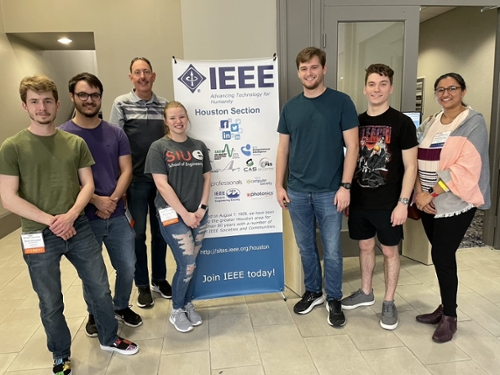IEEE Region 5 Student Conference
Posted April 18, 2022
Five students from SIUE’s Electrical and Computer Engineering Department attended the IEEE (Institute of Electrical and Electronics Engineers) Region 5 Student Conference in Houston, TX on Saturday April 2, 2022. The IEEE is one of the world’s largest professional societies, with Region 5 of the IEEE encompassing most of the central part of the country. The SIUE IEEE student branch is co-advised this year by Drs. Amardeep Kaur and George Engel who accompanied the group to Houston this year.
A two-person team, comprised of seniors Wyatt Marks (Mount Vernon, IL) and William Gallagher (Bloomington, IL), participated in the IEEE Region 5 Circuit Design Competition. The team earned First Place in the contest and was awarded a cash prize of $500. The student team was challenged to solve a technical problem which was provided to the team on the day of the competition. Their design involved the use of an Arduino micro-controller and several sensors.
When asked about his reaction to the team’s participation and success in the competition, Professor Engel, the team’s faculty co-advisor commented, “While SIUE has participated in the IEEE Student Contests many times over the past 30 years and has even placed in the top three in some of the other students contests, this is the first time that we have placed in one of the top three spots in the Circuit Design Competition. While our teams always work hard and our students benefit greatly from participating, the competition is always extremely stiff. I was elated that this year’s team could experience the joy of standing on stage and having their talent and hard work acknowledged by the IEEE.”

Dexter Elmendorf (Alton, IL), currently a graduate student in the ECE Department, participated in the IEEE Region 5 Student Poster Competition. He took Second Place in the competition and was awarded a cash prize of $500. Mr. Elmendorf was invited to participate in the contest as a result of his winning poster competitions at the IEEE Section and Area level. Posters for the contest address technical, engineering, management, or societal aspects of any subjects relevant to science, engineering and technology.
Mr. Elmendorf’s presentation was entitled “Flexion and Abduction Finger Tracking Gloves for VR Applications”. He was required to make an oral presentation and answer questions about the poster at the contest in Houston. While Dexter presented at the conference, the poster represented the work of a Senior Design Group (Summer 2021) whose members were Dexter Elmendorf, Spencer Smith, Keri Henschen, and Mason Burt.
Also attending the conference was a senior Kelsey Haines (Glen Carbon, IL) and a junior David Mathus (Godfrey, IL). They participated in the IEEE Region 5 Student Ethics Competition The contest presents two-person student teams with a case study. Students have to identify the ethical issues faced by the engineers in the hypothetical case and then propose what steps the engineers should take so as to avoid charges of ethical misconduct while minimizing harm done
to others involved in the case. When asked about the importance of the contest, Engel responded “This type of contest helps students think about what they should do when faced with an ethical dilemma. It is important that they wrestle with these issues as student in a contest setting, rather than out in the workplace where the penalty for taking inappropriate action can be quite severe, for example, loss of their job or even worse.”











